Postgraduate study in France, personal experience
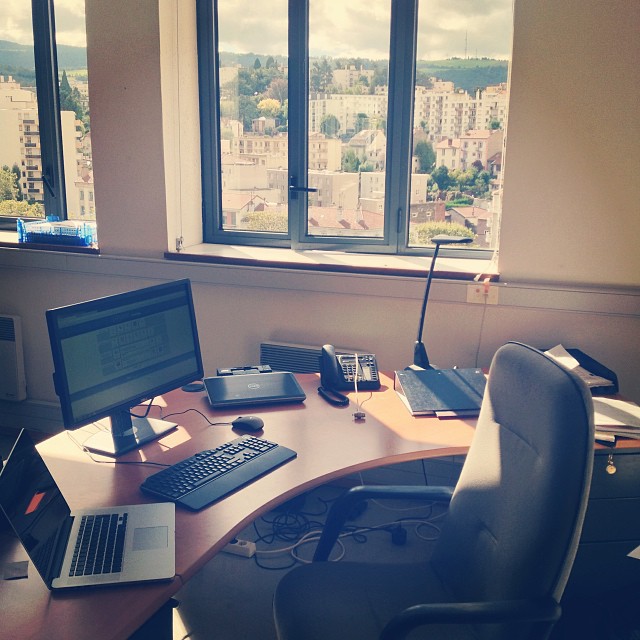
Arrival
While still a senior student, I was thinking about continuing my studies abroad. I began to actively search around January 2013, when I was studying for a master’s degree in computer science. Then I went around several professors of our university, including the dean, asking them about the joint programs of our university with foreign ones. However, to my regret, there were no such programs. But then the head of the department of the theory of algorithms advised me of a Russian-speaking professor at the University of Ecole Nationale Supérieure des Mines de Saint-Étienne in France. The subject was quite in line with my preferences, so I decided to write and find out the details.
As many probably already know, for admission is not required to pass exams. However, you need to collect a lot of documents. The list is approximately as follows:
- Diplomas of education, translated into English / French, or certificate of current progress in the event that you have not completed the magistracy. An important role is your average score. It is also worth noting that you can save a lot on translation if the university has an international department that deals with the design of diploma translations on university letterhead.
- Recommendations from 3-5 professors. Immediately write them in English / French.
- Motivation letter. It describes why you want to learn and what goals you set.
- Extracts from the dean's office about your performance relative to other students. We did not do these things, so I asked the head of our department to write something similar to the fact that I am one of the best students. Generally. It is advisable to include in all recommendations information on how you are evaluated relative to other students (for example, that you are in the top 10% of students in the stream).
- It’s good if you already have publications (I didn’t have them, and this didn’t stop them), certificates for passing courses (these could be online courses, for example at coursera ) or olympiad diplomas (I had silver at the astronomy internship, but I'm not so sure how much it helped me because of the obvious connection with algorithms, mathematics and computer science in general, which is not obvious at first glance).
- It is also quite logical to require a photocopy of the passport and, which is not quite standard, translation with an apostil of a birth certificate is very important.
')
It is also necessary to have a skype interview in English, but you shouldn’t be too afraid of it (unless of course you can explain it in a foreign language), because it’s not asked to solve some difficult tasks in your mind, but rather just communicate with you to clarify the overall adequacy.
Hooray! As a result, on June 3, after several months of correspondence (the first letter was on February 5) with the professor and sending a considerable number of megabytes of documents, I learned that I was given a scholarship of € 2,050 (worth noting that only 1,650 actually come into my hands).
Visa
There should be no problems with getting a visa. as the university is sending a special invitation - convention d'accueil. Next, self-filing for a visa and a week later - voila! I was given a 1 year visa for a scientist (Le visa de long séjour “scientifique-chercheur”). For the next two years, it will be necessary to obtain a residence permit, which can be both for a student and for a researcher (the first is cheaper, but if you plan to stay in France, the second gives you more opportunities in the future).
Where i work
The institute in which we work is not located in the main building of the University, students and undergraduates come here not often and only for consultations. There are 2-3 Ph D students in each room. Everyone has their own desktop. They also give out Dell laptops with a Core i7 processor, which in the office can be connected to the docking station to work on a large monitor and with a full-fledged mouse and keyboard. They also give out a bag and another charger for a laptop so that you can take it home with you (a trifle, but nice). At the very beginning of the article posted photos of my workplace. But such a view could be seen from the window when the first snow fell:
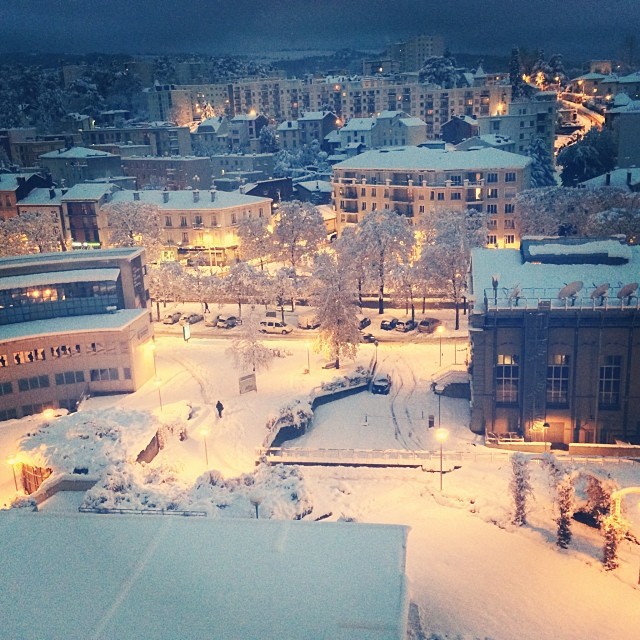
What i do here
Not. I do not listen to tedious lectures here. Everything happens differently. The main lesson is the reading of various articles on their topics, the preparation of publications, and, most importantly, the writing of the Ph.D. The university cooperates with various large companies ( Renault , SNCF and others), for which various production optimization projects are carried out. Often, scientific articles are written on the basis of the methods and algorithms developed for such companies, and on the basis of the results obtained. It takes much less time to complete the required academic minimum (you need to listen to a certain number of core and general courses that you can choose yourself - the choice is large and lots of interesting). A part of this watch was easily closed for me by studying French. Also, for a set of hours, you can become a small project manager for students (I, for example, helped students with the implementation of the C-method on C) or carry out practical exercises (since I had almost 4 years of programmer experience in one of the Minsk companies, I was offered help with practical training on Oracle DBMS). It is also sometimes necessary to write reviews on other people's publications.
What is the money spent on
| Annual expenses | |
|---|---|
| Training | 388 |
| Visa validation | 240 |
| Sports subscription | 25 |
| Subscribe to Velivert city bikes | 15 |
| Insurance for an apartment | 70 |
| Total | 738 euros |
Yes, despite the fact that I am being paid a scholarship, I need to pay for the tuition. I think this is because the scholarship is not a university, but a special fund. Another minor nuisance is that even though the visa is even for a year, but without a special stamp, it is valid only for the first three months. To obtain this special stamp you must go to Lyon and pay 240 euros for the procedure. For 25 euros per year, you can attend any number of sports clubs, and the list is very large: football, basketball, volleyball, big and table tennis, various types of dance, fitness or wrestling, and much more (I chose climbing). As in many cities in Europe, there are city bicycles that can be taken from one parking lot, and returned to another, with the first 30 minutes you can ride for free (my way to work takes 10 minutes), but you need to issue an annual subscription, which costs 15 euros . You can also use public transport (1.3 euros per trip or 25 euros for an unlimited number of trips per month).
| Monthly expenses | ||
|---|---|---|
| Payment of the apartment | Rent | 350 |
| Shine | 50 | |
| Water | 15 | |
| Orange (ADSL + Mobile) | 50 | |
| Nutrition | 300 | |
| Total | 765 euros | |
Saint-Etienne is a small city, thanks to which the housing is cheap enough (in comparison with Paris or Lyon). You can find an apartment on the site leboncoin, for example. But the necessary condition for renting is that you (or your friend) look at it before signing the contract (therefore I searched for an apartment during my first week of stay. I lived this time in guest houses on campus). I think it would be quite useful advice to look for an apartment with gas heating. I have electric batteries and I spend a lot of money to pay for electricity, and gas is still cheaper. No central heating. Everyone in the apartment has its own boiler for heating water and radiators with regulators for heating.
A sim card can be connected with home Internet (my tariff includes 3 gigabytes of 4G traffic (slowing down when exceeded), multisym for using the tablet with a phone, and home unlimited internet at 15 Mbps, there is also 100 gigabytes in the Orange cloud for storing something and the ability to watch TV).
Food on average is about twice as expensive as in my hometown of Minsk, but this does not apply to wine and cheese, which are much cheaper here.
As a result, about 800 euros per month remains for buying clothes, traveling, and so on.
A little about the city itself and its surroundings
Despite the fact that the city is small (population about 200 thousand people, the 16th city in France by population), it has everything you need (the French province is very different for the better from the provinces on the post-Soviet territory). For example, there is Ikea (where I buy cheap enough furniture that I don’t have enough), Apple service (in which I changed the screen in my MacBook 15 ”Retina for 1.5 hours due to a couple of broken pixels), along the main street there are many different boutiques with shoes and clothes, there are cheese and wine shops, well, or the large shopping center Center Deux (located by the way not on the outskirts, but on the main street passing through the entire city from north to south, along which the trams also go).
And if something is suddenly still missing, you can easily get a direct TER train to Lyon in 45 minutes or a ride at a speed of about 300 km / h to Paris in 2 hours and 45 minutes by direct train (but already TGV), well, or Marseille (3 hours, as you will have to transfer in Lyon).
The city has museums, cinemas, a large stadium, on which the football club is based, who won the title of Champion of the country more often than other French clubs. Also, the city has its own website .
The city is not a tourist at all, there are no people eager to sell you something that is not needed at all. You can safely walk at night (in contrast to Paris). A lot of greenery, and generally surrounded by mountains, fresh air, clean water (for 6 months of using an electric kettle, I never had scale in it).
Something like this is the way I ride a bicycle or walk (depending on my mood) to work:
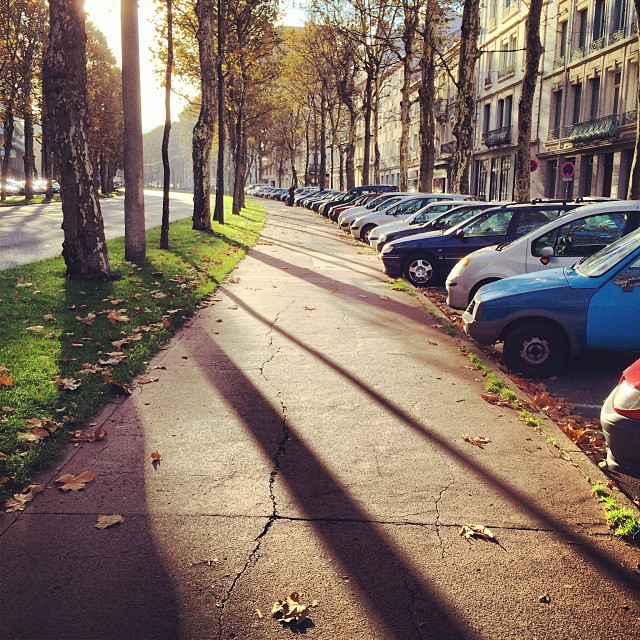
And here is one of the squares of the city, next to which I live:
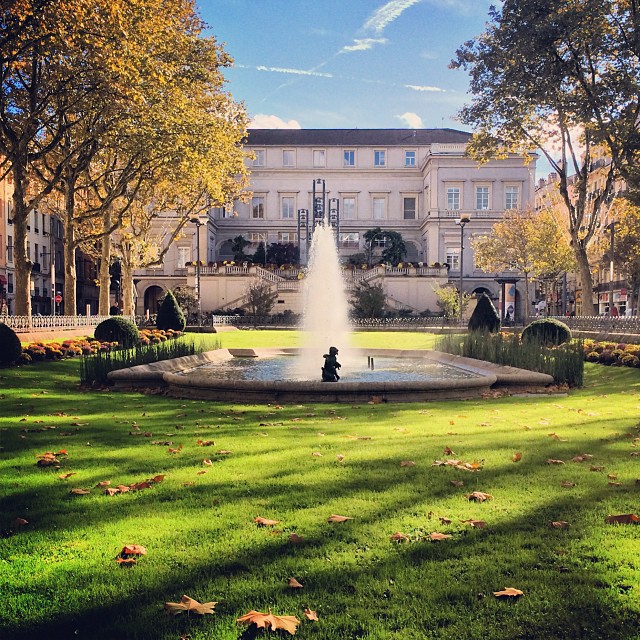
Or is it at the time of the first snow in November (note that the fountain continues to work):
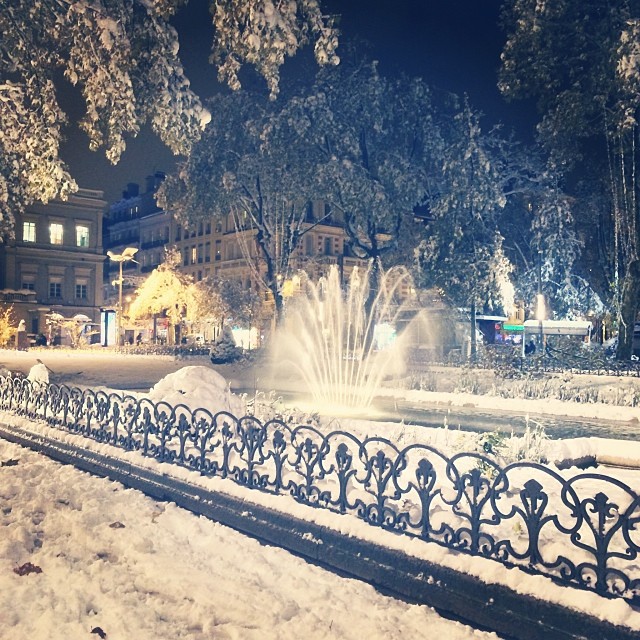
Before Christmas, a ferris wheel was collected on the main square, and nearby you could buy delicious mulled wine:
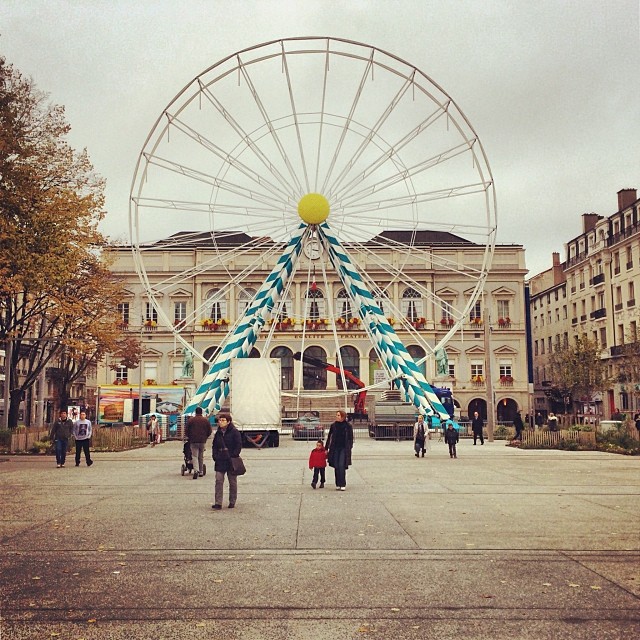
On Sundays, practically nothing works in the city and there are practically no people on the streets:

The city itself is located at an altitude of about 500 meters, while the city has a lot of hills, which offer a view about as in the photo below:
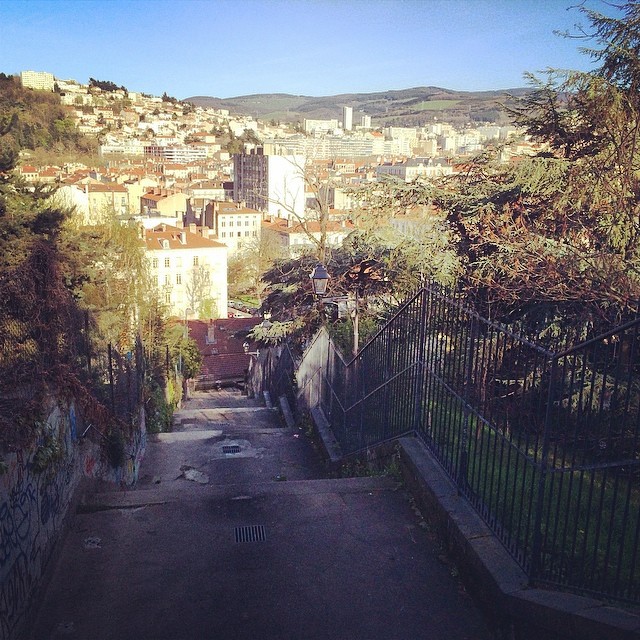
It is also very beautiful around the city, it is surrounded by mountains (on the one side the Alps, and on the other the Massif Central) with a height of about 850 meters or even more if you walk a little further from the city:




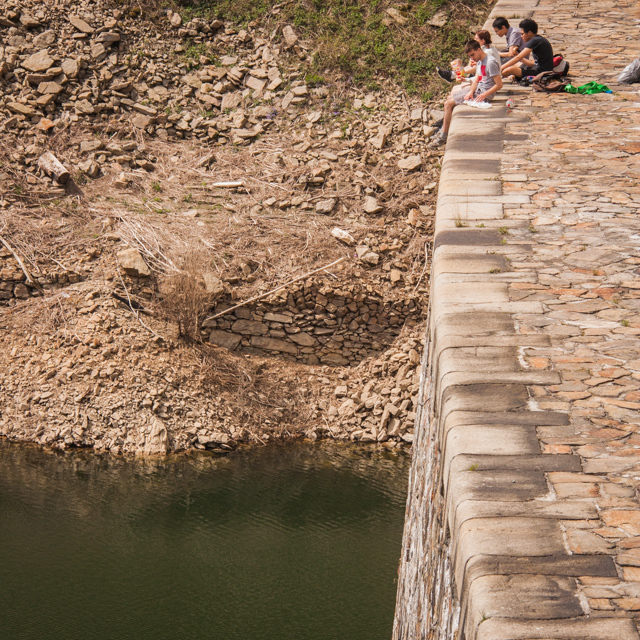
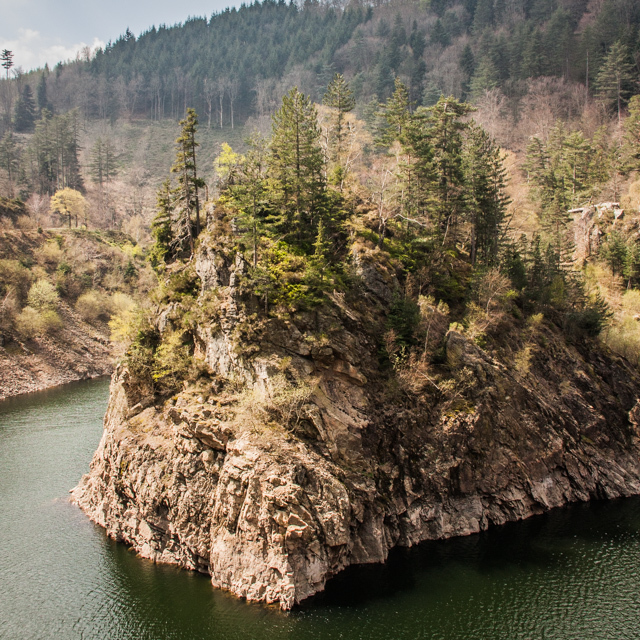
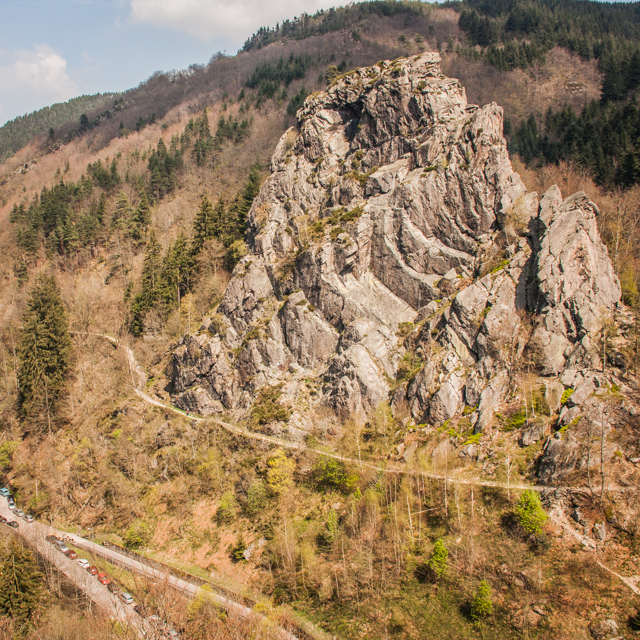
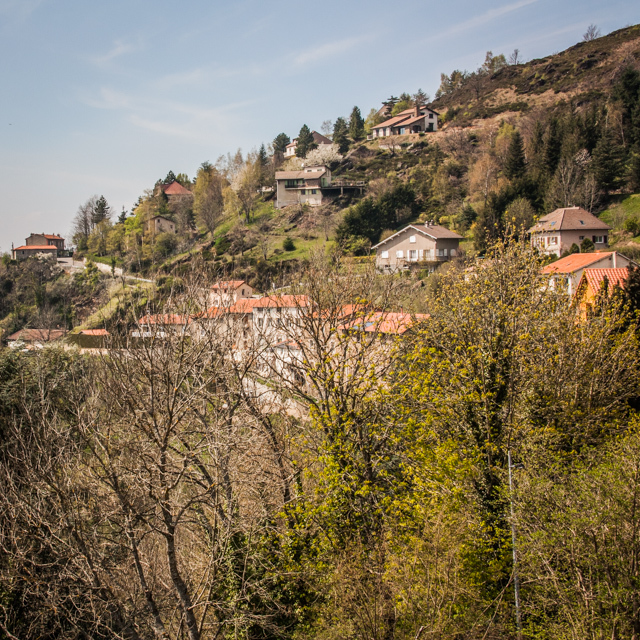
Conclusion
As you might have guessed, I don’t do rocket science here, but in general I like the work I do and the place in which I live.
Source: https://habr.com/ru/post/222517/
All Articles